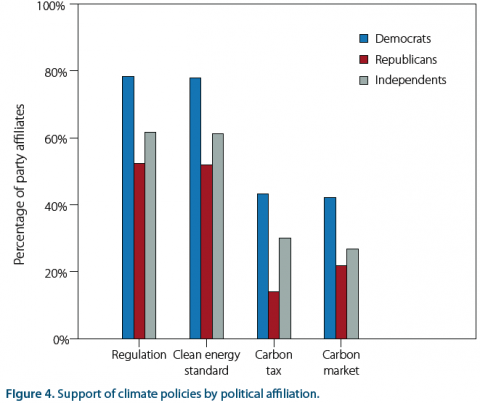Contrary to what you might think, this new survey says that 69% of Republicans think that climate change is a “somewhat” or “very” serious threat.
Table 3. Perception that climate change is a threat among Democrats (N=377), Republicans (N=306), Independents (N=389), and overall U.S. population (N=1089) in January 2013. Columns may not add to 100 due to rounding.
How serious a threat is climate change? Democrat Republican Independent Overall U.S. population Very serious threat 52% 17% 35% 38% Somewhat serious threat 40% 52% 50% 46% Not that much of a threat 7% 29% 13% 15% Not a threat at all 1% 1% 1% 1%
Also contrary to what you might expect (if you haven’t been paying attention), Republicans prefer regulation over an incentive-based carbon tax system by a five-to-one margin.
Compared to a two-to-one margin among Democrats.
This is a prime example of knee-jerk anti-taxism preventing Republicans from implementing, or even considering, the very sort of economically efficient policies that they supposedly believe in.
For another example see Conservatives’ enthusiastic approval of FDR’s WWII inflation-fighting wage controls, which he adopted as a fourth-best option after those Conservatives refused to raise taxes as he wished to drain demand. The result? The crazy employer-based health insurance system we have today.
Cross-posted at Angry Bear.

Comments
One response to “Why do Republicans Hate Market-Incentive Based Solutions?”
I have some working theories as to what’s going on here.
Who says Republicans believe in markets? Your views on what Republicans believe in may be distorted by what conservative intellectuals believe in. I grew up around Republicans and they aren’t big believers in the efficiency of markets, they just distrust the government. Insisting on solutions that involve lots of money changing hands probably feeds into paranoia that this is all about money somehow. They’re skeptical generally and are more easily sold on ideas that are easy to explain. Conservative intellectuals think Medicare should be more market based like Obamacare and Social Security should be replaced with privatized accounts that individuals manage; real conservatives love Medicare and Social Security as they are.
Also, who says this is a Republican thing? Your chart shows “market” solutions are unpopular across the spectrum. I suspect a more relevant divide would be college educated vs not, or more to the point, has taken and remembers an econ course vs not. The market solutions aren’t obvious responses to the problem. The obvious thing to do is move away from polluting technologies toward non-polluting technologies, so people expect policies to sound like that, rather than the more indirect “let’s make it expensive to not solve the problem.”
Another way to look at the politics is that people prefer options that make solutions explicit over ones that make the costs explicit.
Another possible explanation is that people see the issue more in moral terms than in terms of economic costs. Moral issues and rules and regulations just feel right together. Okay, try this one out: “The child sex trade is a moral outrage, so people who perpetuate it should have to purchase offsets.” Doesn’t feel right, somehow, does it?
I suspect some combination of all of these things is behind this, as well as anti-tax attitudes.